Brief Review of Malaysian Fatwa on Organ Donation
Organ donation in the context of life preservation is a complex and sensitive issue, especially from a religious point of view. In Islam, the preservation of life is a principle that is highly valued in Maqasid Syariah, which is the purpose of Islamic law that includes the protection of life, religion, intellect, offspring, and property[i]. In line with the Sustainable Development Goals (SDGs), organ donation also plays an important role. The SDGs elements in organ donation include SDG 3, good health and well-being. Organ donation emphasizes the need for easily accessible health care services, including organ donation that significantly improve the health and quality of life of recipients[ii]. In this context, organ donation can be seen as a concrete implementation of Maqasid Syariah and a contribution to achieving the SDGs. This article will explore fatwas and religious rulings related to organ donation in Islam, and how this action can be seen as a way to fulfill the Maqasid Syariah and support the achievement of SDG Goal 3.
The General Concept of Organ Donation
Generally, organ donation is a surgical procedure that involves transferring an organ from a donor to an organ recipient.[iii] In general, the organs that can be donated are kidneys, heart, liver, lungs, and pancreas. Tissues that can be donated are eyes, bones, skin and heart valves.[iv] Other organs, such as the heart, lungs, pancreas, and intestines, however, can only be donated after the donor has been declared dead since they cannot survive without these vital organs.[v]
The process of obtaining organs and tissues from a donor's body will only be done when death has been confirmed by two doctors with the confirmation of the donor's death being independent and unrelated to organ and tissue transplantation.[vi] In general, there are two types of organ donation, namely organ donation after death and organ donation during life.[vii]
Maqasid Shariah and Organ Donation: Preservation of Life
In Islam, the phrase "Hifz al-Nafs" refers to taking care of one's health and life. This phrase is a combination of the Arabic terms "Hifz" and "al-Nafs," which both mean "taking care" and " soul."[viii] Islamic legal scholars under Hifz al-nafs established the legality of organ donation and transplantation in Islam based on maqasid shari'ah and the need to save a life[ix]. This context, organ donation can be seen as an action that supports the maqasid sharia by providing an opportunity to save lives and improve the quality of life of individuals in need. Besides, organ donation also reflects the principles ta’awun (helping one another) which are important values in Islam as in the following verse of the Qur'an[x] :
وَتَعَاوَنُوْا عَلَى الْبِرِّ وَالتَّقْوٰىۖ وَلَا تَعَاوَنُوْا عَلَى الْاِثْمِ وَالْعُدْوَانِ
Cooperate with one another in goodness and righteousness, and do not cooperate in sin and transgression. (Surah al-Maidah: 2).
Fatwas and Religious Rulings on Organ Donation
Organ donation is a controversial topic among schools of thought in Islam, resulting in differences of opinion regarding its capabilities and limitations. However, there is no clear provision on organ donation and tissue transplantation in the Quran and hadith, but there are general provisions and rules that have been issued based on ijtihad. Some schools of thought, such as pioneered by a small number of scholars of the Syafie schools such as Imam Nawawi and scholars of the Hanbali school such as Ibn Qudamah, all of them affirmed that the act of transferring the organs of the dead to the living with the aim of helping the recipient to survive is permissible but it set additional strict conditions, including the full consent of the donor before death[xi]. This difference of opinion is related to the interpretation of law and ethical principles in the sects.
In addition, Malaysia's Fatwa on organ donation was issued by the Fatwa Committee of the National Council for Islamic Religious Affairs of Malaysia. In this fatwa, they state that organ donation is permissible in Islam under certain conditions.[xii] The fatwa emphasizes the importance of full consent from the donor or his family before death, as well as the need to maintain the integrity of the donor's body and fairness in the allocation of organs.[xiii] This Malaysian fatwa also acknowledges the importance of organ donation in saving lives and improving the quality of life, as well as providing guidance to Muslims in Malaysia in dealing with the issue of organ donation.
Conclusion
Organ donation in the context of life preservation is an important topic in Islam and has been given serious attention through fatwas and religious assessments. In Malaysia's Fatwa, stated that organ donation is permissible in Islam under certain conditions. These fatwas provide guidance to Muslims regarding the acceptance and limitations related to organ donation, but there are differences of opinion between schools of thought regarding its abilities and additional conditions required. Despite this, organ donation is a philanthropic-act that can improve the quality of life and give organ recipients a second chance. By following the principles of the SDGs, organ donation can contribute to creating a better, healthier, and more sustainable world. In Islamic view, organ donation plays an important role in achieving the main goals of religion, such as preservation of life, generosity, and love for fellow human beings.
References and Endnotes
Abdullah, R. S. (n.d.). Pendermaan Dan Pemindahan organ. PENDERMAAN DAN PEMINDAHAN ORGAN. http://mufti.terengganu.gov.my/index.php/96-himpunan-kertas-kerja/153-pendermaan-dan-pemindahan-organ
Aliya Khan MD, Ali Iqbal MD. Hamid Slimi MD. (2022). Organ Transplant in Islam. Journal of the British Islamic Medical Association, 1-2.
Altfa. (n.d.). Derma organ. jata negara. https://www.infosihat.gov.my/projek-khas/derma-organ.html
Awani, A. (n.d.). Salah faham tentang isu derma organ. Astroawani.com. https://www.astroawani.com/berita-malaysia/salah-faham-tentang-isu-derma-organ-7656
Hasri H., Hasliza M.A., (2021). Konsep Hifz An-Nafs (Pemeliharaan Nyawa) berdasarkan Maqasid Shariah Dalam Menghadapi Pandemik Covid-19. International Conference on Syariah & Law2021(ICONSYAL 2021).
Harian, B. (n.d.). Pemindahan Organ Orang mati diharuskan | berita harian. Pemindahan organ orang mati diharuskan. https://www.bharian.com.my/bhplus-old/2015/09/79093/pemindahan-organ-orang-mati-diharuskan
Nadzirah. (2019, June 18). Bayan Linnas siri ke-35: Pendermaan Organ. Pejabat Mufti Wilayah Persekutuan. https://muftiwp.gov.my/en/artikel/bayan-linnas/1816-pendermaan-organ
Unit Perkhidmatan Transplan. (2011). Pendermaan Organ Semasa Hidup: Maklumat Untuk Anda. Bahagian Perkembangan Perubatan, Kementerian Kesihatan Malaysia.
United Nations. (n.d.). Innovative Organ Transplant procedure at the Teaching Hospital of the University of the Witwatersrand. United Nations. https://www.un.org/en/academic-impact/innovative-organ-transplant-procedure-teaching-hospital-university-witwatersrand
Tazul Islam (2021). Organ Donation in Islam: A Search For A Broader Qur’anic Perspective. Universiti Sains Islam Malaysia.
[i]Awani, A. (n.d.). Salah faham tentang isu derma organ. Astroawani.com. https://www.astroawani.com/berita-malaysia/salah-faham-tentang-isu-derma-organ-7656
[ii] United Nations. (n.d.). Innovative Organ Transplant procedure at the Teaching Hospital of the University of the Witwatersrand. United Nations. Retrieved on 9 May 2023, from https://www.un.org/en/academic-impact/innovative-organ-transplant-procedure-teaching-hospital-university-witwatersrand
[iii]Unit Perkhidmatan Transplan. (2011). Pendermaan Organ Semasa Hidup: Maklumat Untuk Anda. Bahagian Perkembangan Perubatan, Kementerian Kesihatan Malaysia.
[iv]Altfa. (n.d.). Derma organ. jata negara. Retrieved on 9 May 2023, from https://www.infosihat.gov.my/projek-khas/derma-organ.html
[v] Aliya Khan MD, Ali Iqbal MD. Hamid Slimi MD. (2022). Organ Transplant in Islam. Journal of the British Islamic Medical Association, 1-2.
[vi] Altfa. (n.d.). Derma organ. jata negara. Retrieved on 12 May 2023, from https://www.infosihat.gov.my/projek-khas/derma-organ.html
[vii]Abdullah, R. S. (n.d.). Pendermaan Dan Pemindahan organ. Retrieved on 12 May 2023, from http://mufti.terengganu.gov.my/index.php/96-himpunan-kertas-kerja/153-pendermaan-dan-pemindahan-organ
[viii]Hasri H., Hasliza M.A, Konsep Hifz An-Nafs (Pemeliharaan Nyawa) berdasarkan Maqasid Shariah Dalam Menghadapi Pandemik Covid-19, International Conference on Syariah & Law2021(ICONSYAL 2021), page 58-59.
[ix]Tazul Islam, Organ Donation in Islam: A Search For A Broader Qur’anic Perspective, (Universiti Sains Islam Malaysia: 2021), page 237-254.
[x]Surah al-Maidah: 2.
[xi]Harian, B. (n.d.). Pemindahan Organ Orang mati diharuskan | berita harian. Pemindahan organ orang mati diharuskan. Retrieved on 12 May 2023, from
https://www.bharian.com.my/bhplus-old/2015/09/79093/pemindahan-organ-orang-mati-diharuskan
[xii]Jawatankuasa Fatwa Majlis Kebangsaan Bagi Hal Ehwal Ugama Islam Malaysia. (2014). Fatwa kebangsaan: Pendermaan organ. Retrieved on 10 May 2023 from https://www.e-fatwa.gov.my/fatwa-kebangsaan/pendermaan-organ
[xiii]Jawatankuasa Fatwa Majlis Kebangsaan Bagi Hal Ehwal Ugama Islam Malaysia. (2014). Fatwa kebangsaan: Pendermaan organ. Retrieved from https://www.e-fatwa.gov.my/fatwa-kebangsaan/pendermaan-organ
About the author
Nur Hasya Binti Zulkifli is an undergraduate student of the Department of Fiqh and Usul al-Fiqh at International Islamic University (IIUM), Kuala Lumpur.
Disclaimer
The views expressed in this article are the author’s own and do not necessarily mirror Islamonweb’s editorial stance.

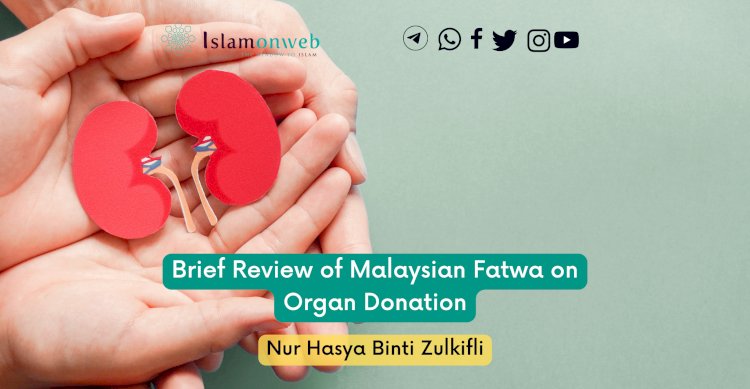



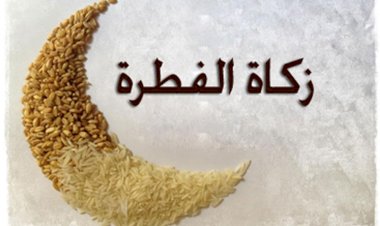
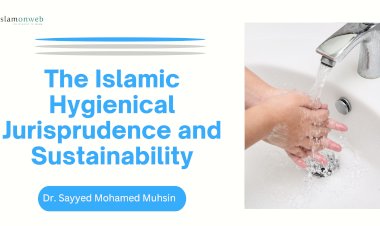

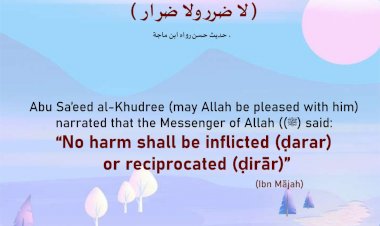
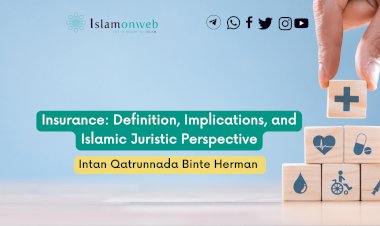














Leave A Comment